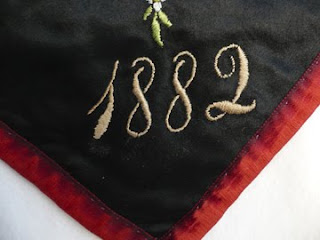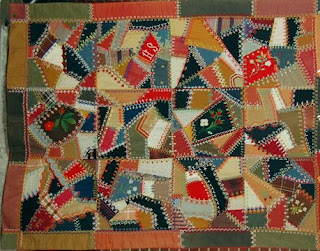Crazy Quilt by Sarah Frances Coolidge,
date inscribed 1882, from Copake Auction House
In my 1989 book Clues in the Calico I wrote:
Crazy Quilts are so recognizable and so commonplace they are among the easiest quilts to learn to date, especially since there is a simple rule: There were no Crazy Quilts made before the late 1870s.... Because women made so many Crazy Quilts, and because they dated them (they are among the most commonly dated style of quilt), we can track the trend well through the dated examples.
Crazy Quilt date-inscribed 1885, from dealer Laura Fisher
In the past twenty years I've seen a lot more crazy quilts. I still agree with my younger self: There were no crazy quilts before the late 1870s. But now that I've seen so many more I am going to narrow that time frame and say there were no crazy quilts before 1880.
Crazy quilt date-inscribed 1900
Here are the statistics from the database I created 20 years ago:
There were 97 date-inscribed Crazy Quilts in the database.The earliest of the 97 were three examples dated 1882.
For the years between 1882 and 1889, I found 36 examples.
In the decade 1890-99 there were 29....
Detail of a Crazy Quilt dated 1882 in ink
Crazy Quilt date-inscribed 1892
In that database I found some outliers. In statistics an outlier is defined as
An outlying observation, one that appears to deviate markedly from other members of the sample in which it occurs.
In Clues in the Calico, I said that I eliminated two quilts from the database, two crazies date-inscribed 1846 and 1868. These dates were so far earlier than the rest of the 67 quilts that I felt I had to eliminate them as outliers. Those dates were so markedly deviant that they would lead us to false conclusions. The dates may have been altered, added later or commemorative of a birthdate or other year rather than the year the quilt was made.
I do recall seeing one Crazy Quilt dated 1691 when we were doing the Kansas Quilt Project. Someone had picked out the embroidery changing the second numeral, an 8, into a 6. This was also an outlier and I ignored it.
I recently saw this Crazy Quilt in an online auction. It's an outlier and my first thought was that someone had changed the date 1894 to 1874, but in the picture there is no evidence of that. Then I looked at the rest of the quilt.
The tied quilt was wool and wool blends, rather minimally embroidered, the kind you often find dated about 1900. A few of the blocks had words or dates on them.
I think the date February 17th, 1874 is commemorative and it has something to do with Mamma, possibly the day she died.
So I am sticking to my 1880 guideline.
This one with dates from 1854-1888 must also commemorate something in the family whose last name starts with a W. Death dates? Birth dates?
I'll post more about outliers in my next post.












I just wanted to let you know that I enjoy you blog.
ReplyDeleteVery interesting! I love crazy quilts. Making them and studing others. Thanks for the info. I'm looking forward to your next post.
ReplyDeleteI always learn something from your blog, that I read avidly.
ReplyDeleteI have been planning on making a crazy quilt for some time now. 2 other gals are joining me. So far we are still gathering the fabrics. From what I can see, there are very little printed fabrics in crazy quilts, most of the fabrics are solids with a few variations. Is there a reason for this?
ReplyDeleteCindy
These early quilts do tend to be of solids, probably because they liked to embroider on top. By the 1920s crazy quilts were often pieced of splashy rayon prints.
ReplyDeleteBarbara
ReplyDeleteYou are such an informative quilter ! LOve your blog.
Crazy Quilts were made during those years when every inch of open space anywhere 'had' to be filled with something. You can see this in Victorian Homes. For someone who tends to be a minialist at heart, I can admire the workmanship but ... lol. "too much stuff" for this quilters :)
Julie in TN
Thanks for the info, I always learn something from your posts. I saw an exhibit of crazy quilts at the Denver Museum, the late '90's, before I was a quilter and they were amazing!
ReplyDeleteBarbara,
ReplyDeleteI have never made a crazy quilt. I always was shying away from having to do embroidery and it wasn't my 'thing'. Looking a there beautiful quilts, I am inspired to make a small crazy for myself.
Few years back, I saw an antique crazy quilt from up close and was stunned by the detailing on each patch of the quilt. I am sure that it took that quilter forever to make.
The quilt from 1892 looks as if there were pearls strung through the stitches. Thank you for sharing!
You are writing about my favorite subject! Thanks, Barbara.
ReplyDeleteI'm really getting interested in what I call "workingman's crazies", like that wool one you have here, "minimally embroidered and tied from the back". I would love to see more of these, in wool or cotton. Got any sources?
Hi Barbara, even though your crazy quilt post is very interesting, I am here to tell you how much I love your book "Encyclopedia of Applique"! I am an appliquer, hence my blog name www.thestrawneedle.blogspot.com. At first I thought I was going to be disappointed with the book as I was expecting a book of applique patterns. However, as I was reading it and then paging through all those wonderful patterns, I was in awe! Seriously. I can see that you have put many, many hours in this book. I love how you cataloged(sp)everything. Thank you so much for this book. We needed it:)
ReplyDeleteI wonder if you could look at a photo of a crazy quilt to see if it fits in with your time frame? It seems nothing like any crazy quilt shown anywhere and seems much older. It has no date embroidered but does have the initials of 35 people from 9 families embroidered on some of the fabric pieces.
ReplyDeleteI have a crazy quilt from my great great grandmother I know it's made with silk but don't know the date any help would be appreciated
ReplyDelete